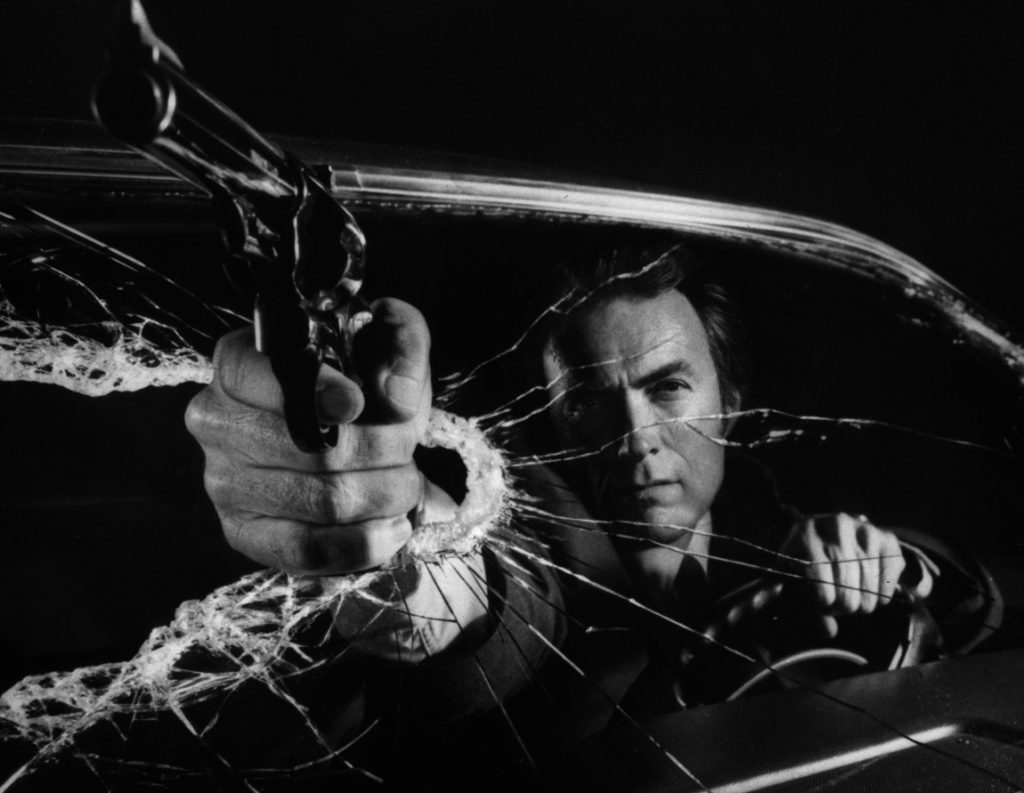THE ENFORCER (1976)

“You laugh at me, you bastard, and I’ll shoot you where you stand.” – Kate Moore
“Dirty” Harry Callahan is at it a third time. This time around, we get a tease of some unconventionality; but we ultimately wind up with the same old formula, which by this time is growing a bit stale.
Eastwood had every intention of helming the director’s duties for The Enforcer, but having overtaken directorial duties for The Outlaw Josey Wales (in a somewhat controversial move which you can read about in my review of that film) left him without enough time to prepare to direct again so soon. Instead, Eastwood made a rather clever decision to promote his longtime assistant director James Fargo to fully helm the film. The partnership allowed Eastwood to ease back on the responsibilities, promote a longtime collaborator, and still manage to maintain control of the production given the longstanding dynamic between him and Fargo. The resulting production was very smooth and efficiently run.
The plot this time revolves around a domestic terrorist who kidnaps the mayor. Callahan, having lost yet another partner, is teamed up with newcomer Kate Moore (played by Tyne Daly), who was hired because of affirmative action on the behalf of gender diversity. Callahan has strong reservations against working with a woman, but Moore eventually earns his respect when she displays integrity at the cost of a promotional award. The pair of them step right up to the edge of romance, but their partnership is cut short before things can come to fruition between them, resulting in a bittersweet victory in what was intended to be the final Dirty Harry film.
There are a handful of merits to the film, primarily revolving around Daly’s performance and the performance of Albert Popwell as a gang leader informant with complex motivations. But rumor has it that the original scripts focused more deliberately on character work, which made Eastwood nervous that audiences would reject it without more action sequences. I would have loved to have seen the resulting film from those more character-centric treatments, as one of the largest criticisms I have for the film is its formulaic treatment of decisively unformulaic characters. There are at least four fascinating characters introduced in this film, not to mention the compelling elements of Callahan himself, which are painfully treated with clichés and predictable ends.
Fans of the more procedural variety of cop thrillers may genuinely enjoy this, and there’s enough of the classic Dirty Harry vibe to satisfy fans of the first two installments, but given the rich style of the first film and the thematic deepening of the second film (and most especially following right on the heels of the powerfully complex film The Outlaw Josey Wales), The Enforcer feels very much like it’s phoning in too many of its elements. It’s not bad, it’s just not very good. Eastwood is as dependable as ever, but he isn’t bringing much complexity to the character – Callahan feels more plastic in this film than he has in either of the previous two installments, which is disappointing.
Particularly disappointing is the treatment of Moore, a treatment which caused Tyne Daly to turn down the role no less than three times before ultimately being convinced to accept it. Both in Daly as a performer and in Moore as a character, there was an opportunity in this film to make some fascinating statements about women in traditionally male-dominated roles (which would have come quite a long way in righting the ship for the treatment of women in Eastwood’s filmography as a whole). But sadly, the choices made are mostly the less interesting and more common ones, especially where the film lands with the character. It may be a bit harsh of me, but in my opinion Daly’s talents are wasted here. She’s an immensely compelling performer and a master of subtle strength. It’s a real shame to think about what she might have given us in this role with a bit more liberty from the script.
It’s easy to see why this film was intended to be the final Dirty Harry film (spoiler alert – it isn’t). There is a certain weariness, both to the character of Harry Callahan and the now-predictable formula of his perils (and the terminal perils of whoever is unlucky enough to partner him). It makes this film a little difficult to recommend, and certainly not the first place to start in the Dirty Harry franchise. Although the film does have some familiarity that fans of the genre will enjoy, it’s an otherwise largely forgettable entry both in its sub-genre and in Eastwood’s filmography.
 Reed Lackey is based in Los Angeles, where he writes and podcasts about film and faith. His primary work is featured on the More Than One Lesson website and podcast, as well as his primary podcast, The Fear of God (which examines the intersection between Christianity and the horror genre). Follow him on Twitter or on Facebook to receive updates on his reviews and editorials.
Reed Lackey is based in Los Angeles, where he writes and podcasts about film and faith. His primary work is featured on the More Than One Lesson website and podcast, as well as his primary podcast, The Fear of God (which examines the intersection between Christianity and the horror genre). Follow him on Twitter or on Facebook to receive updates on his reviews and editorials.

